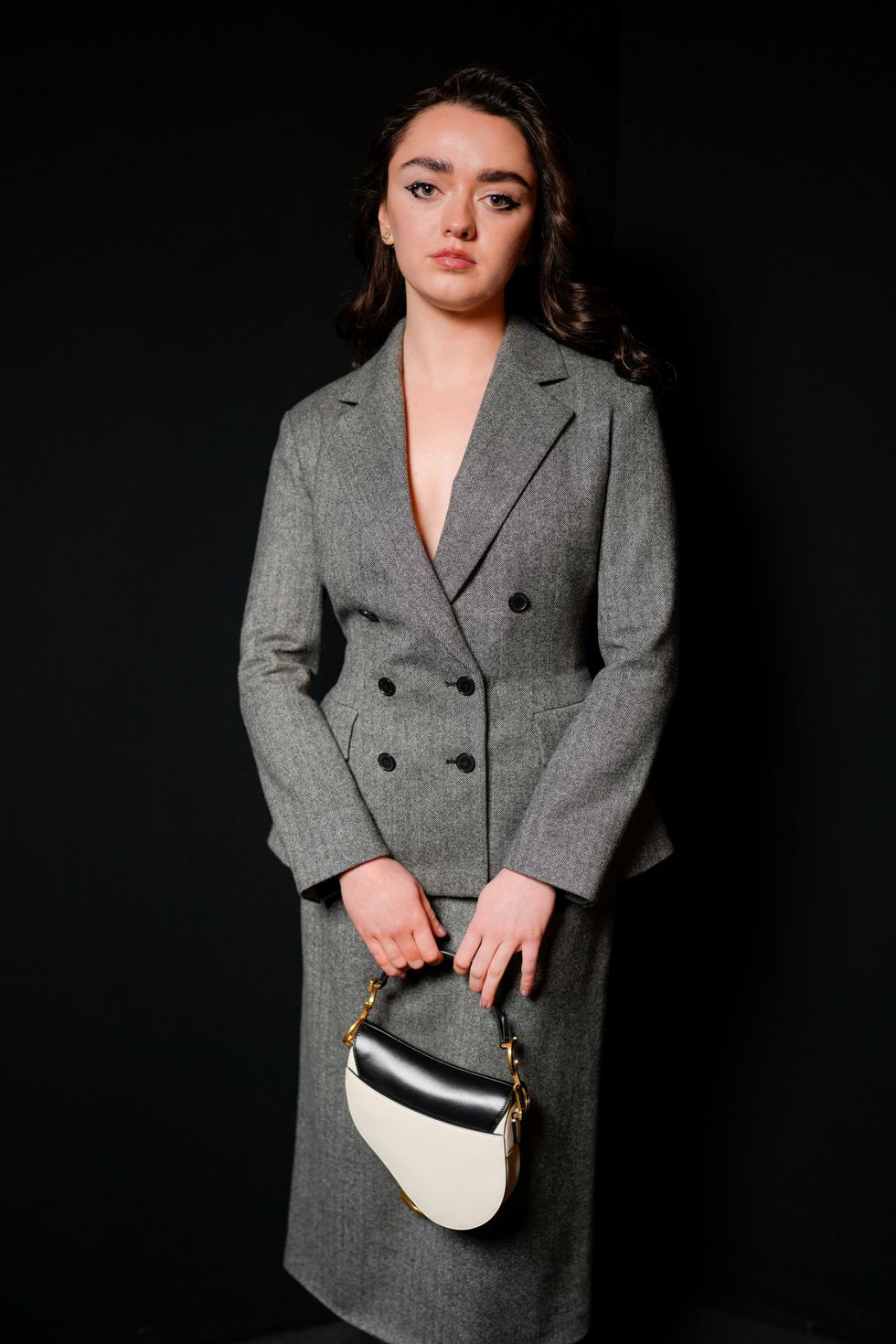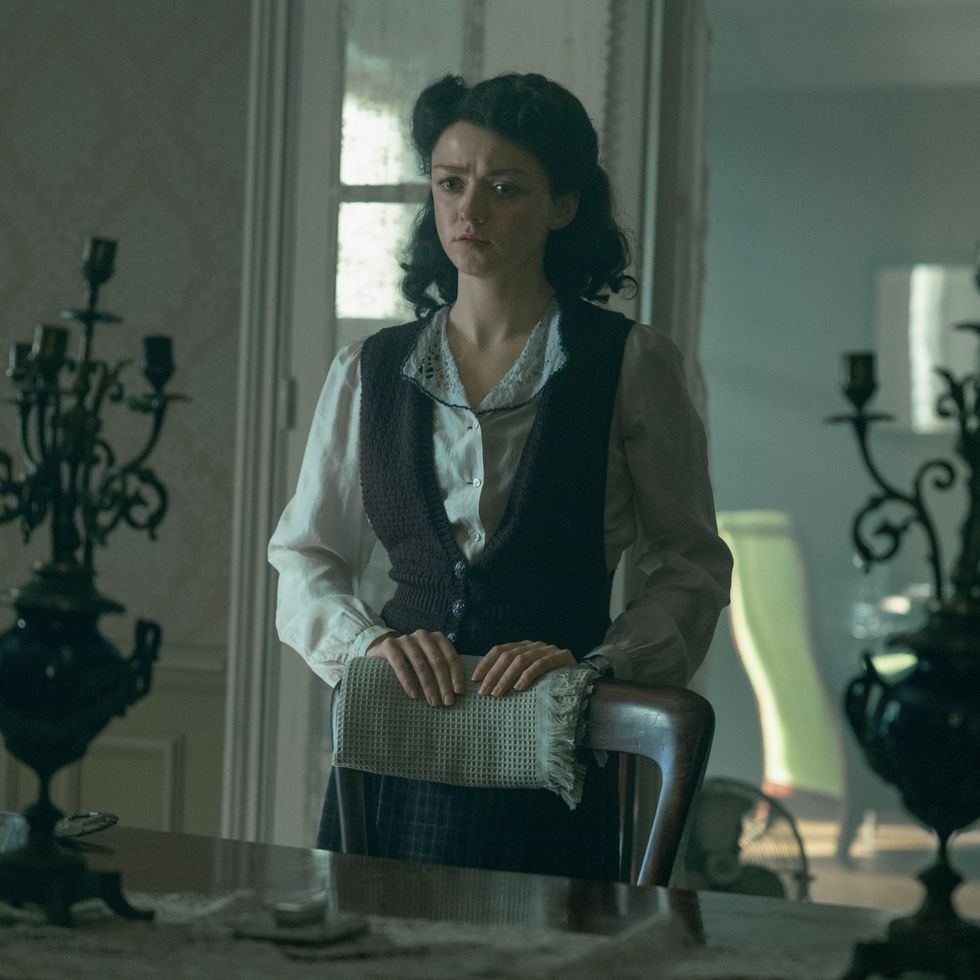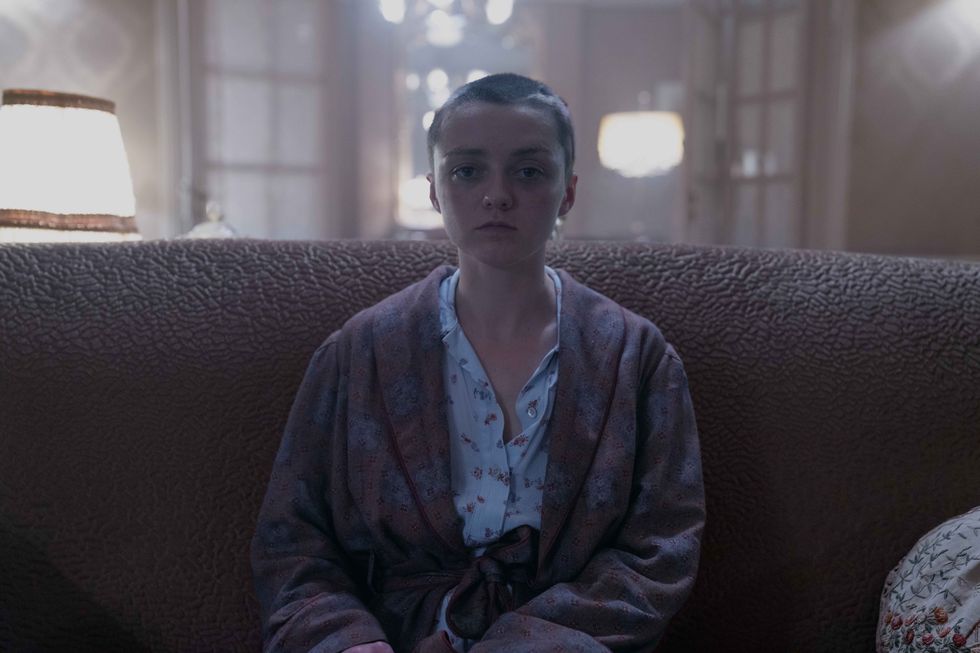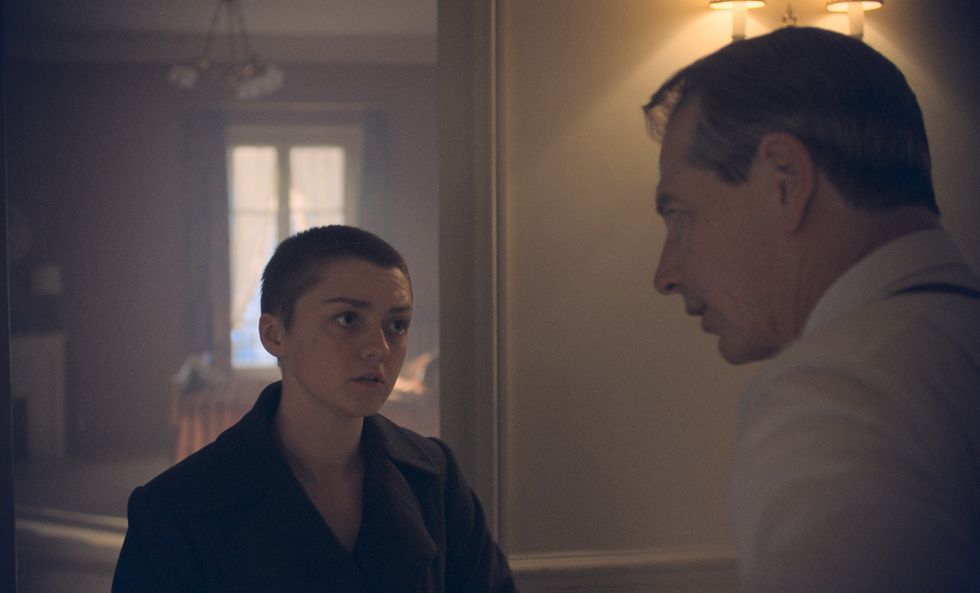Maisie Williams on How The New Look Transformation Changed Her Life: ‘I Built It Back, But Then Some’
As Catherine Dior in Apple TV+’s based-on-a-true-story drama The New Look, Maisie Williams remains recognizable, if only for her unique facial features: Most Game of Thrones fans could spot Arya anywhere, even in 1940s Paris. But to play the French Resistance member and sister to Christian Dior (Ben Mendelsohn), Williams underwent a dramatic physical transformation, particularly for scenes filmed for episodes 6 and beyond. These chapters depict events after Catherine returns home in 1945, having endured months of deprivation and torture in prisons, camps, and factories, including the infamous women’s concentration camp Ravensbrück.
To embody this version of Catherine, Williams lost a significant amount of weight, shaved her head, and began a demanding routine overseen by medical professionals. As she shared with Harper’s BAZAAR UK, she spent hours meditating, burning incense, sleeping little, taking “boiling-hot” baths with “lots of salts in it.” The resulting physical change is apparent on screen—but Williams claims the biggest shift had not to do with her body or her acting, but with the role’s impact on her personal life. Ahead, Williams discusses playing the muse behind “Miss Dior,” and explains why shutting out the noise of reality allowed her to finally reset.
How did this role come to you, and what ultimately compelled you to do it?
I actually auditioned for another role—it was a different version of the show, and that role didn’t end up being in the show. It all changed a little bit, but when the audition came in, I knew immediately when it said “The New Look,” what it was going to be about, because I was familiar with this collection. I auditioned and then waited, and I got a callback for Catherine, and I sat with Todd [A. Kessler, who wrote, directed, and produced the show] and we had a big call about her life and her story and what would be featured in the show. In getting to know Catherine, I felt like not only would this be a great show to be a part of, but this would be such an amazing character to play.
Was there any hesitation or reluctance on your part, knowing that this was going to be a complicated role physically, emotionally, and mentally? Or did those elements endear it to you all the more?
It endeared it to me all the more. I can’t speak on behalf of all actors everywhere, but I certainly feel like the more tools you get to use when creating a character, the more fun it is to do. And although these things can be quite challenging, it’s just what I love.
I think you can really make good work when you, yourself, are in a good place. I think there’s this idea of the pained artist, someone who can only create because of the pain, and if you were to be healed from the pain, then would you still be able to make good work? Everyone thinks about that differently, but for me, I certainly feel like the best work that I’ve ever done is from a place where I feel like my life is going well and it’s not just about work. At this time when the audition came in, I had all these ideas and I had all this excitement around it, rather than feeling like, Oh, God, this is going to tip me over the edge, or something. I felt the opposite.
You mentioned having these ideas and excitement around this character…what about her, in particular, was so transfixing to you?
Just this blend between a woman who was so fierce and so dedicated and so tough, and then juxtaposing that with this beautiful femininity, this muse of one of the most iconic fashion houses of all time. I really resonated with that. Not that I’ve ever been a muse of a brand, but I’ve felt like I don’t connect with femininity a lot in media. But I felt like this was a woman that I could connect with.
This woman in the 1940s, I’ve never looked like that on screen. I don’t look like that in real life. I had this amazing wig and these beautiful clothes, and even that I still deem as a huge part of my physical transformation for this role. I felt excited to feel powerful as a woman in a time period where women did have distinctly less power than they have now. I wanted to really reject a lot of the things from my life and get further away from my life, and then I could start to build her life on top of mine instead.
You’ve talked a lot before about the physical preparation for this role. But I’m curious about the mental preparation. How did you get yourself into this headspace of being so broken down, yet still so resilient? Catherine has this fight in her, even as she’s lying there in bed in episode 6.
I spent a lot of time meditating while shooting. And so a lot of this mental strain—I know it was definitely there, but I think I just let it pass over me. I didn’t hold onto it so much. I let go a lot of my responsibilities in my own life in preparation. I came away from all of my friends and my family and from my phone. I don’t think I looked at my phone for a month.
Wow.
Which is so nice. It was really a special time, and I am very fortunate that I have amazing friends and family that are so understanding of things like that. Doing that meant that there was a lot of my own personal life matters that weren’t causing me stress, or any additional stress. It can get complicated when you’re trying to be in too many places at once. Limiting that, and just being in Paris in the 1940s, was nice.
How has this show altered your own perspective on fashion? Do you think about it any differently now?
I think it was easier [before] to look at brands as these big corporations, these names that we throw around that are plastered across billboards or magazines or handbags or sunglasses. And I saw it as an industry. I think now I try to see these brands more like people and the stories that came before, even as we see new iterations of the brand and people get hired to replace each designer—the journey that each designer’s on and the evolution of the brand. I think [the show] has connected me a lot more with the human side of it versus just the aesthetic side of it. I think about fashion less about the clothes now and more about the people who make them and design them.
Part of what I appreciate about this show is its inherent belief that fashion is about the people. It’s personal; it’s political. Do you feel as though the modern fashion industry has embraced those personal and political roots? Or do you think that, in some respects, we’ve moved away from that?
I think it really depends on the brand or the person. I think every brand incorporates their history into their modern design so differently. I think whenever you see a new designer come in, you see them taking inspiration from all across the brand, dating back as far as they like. That’s more in a nostalgic way. I don’t think that we talk about the history of fashion in a mainstream pop culture way—but we don’t talk about a lot of history in that way. Maybe we would learn more.
I think that’s what the beauty of this show is: It takes these names that we are so familiar with, these brands that everyone feels they have a connection with, and it shows you parts that you didn’t know before.
World War II is such a specter in our collective memory. I’m curious, what did you discover in revisiting that time period? Did you learn something that you didn’t anticipate?
I think we never spend enough time really looking and analyzing ourselves critically. This show is really about the decisions that we make during the most difficult times in our lives.
In my mind, in a hypothetical situation where I was in Catherine’s position today, I love to tell myself that I would put my own life in danger to save the people that I love. That’s what I tell myself, but really, we have no idea. I think every character in this show is making the best decisions that they feel they can make at that time. And it’s only now, when we look back, that we see the flaws and the beauty in all of those decisions.
It really made me look at myself; I think we have these hypothetical ideas because these things, most of the time, remain hypothetical. But what if they didn’t? Learning about someone like Catherine, who fought so hard for her country, everyone wasn’t doing that. We would all say today that we would do that, but the French Resistance was [estimated somewhere between 1-3 percent] of the population of France. We all like to think that we would stand up in the face [of evil], but it’s a terrifying time to be in an occupation. I think it really made me look at that with a more critical eye, more toward myself and my loved ones.
What was the process of coming back to yourself after filming? What did it feel like to try to get back to being Maisie after you had, in most senses of the word, embodied this traumatized but ferocious woman?
Yeah, it was such an interesting time. I feel like when I was coming back into my own life, into my own body, starting to enjoy my own life again, separate from the life that I built when playing Catherine. I felt like I built it back, but then some.
It felt like a real cleansing of a lot of things, like I could reintroduce all of these parts of my life that I loved and not reintroduce the parts that I didn’t. I remember spending so much more time with my friends after [filming The New Look] than I had before. I have the most amazing friendships, but I felt like over the last year, which was the year after I had been filming, they really flourished so much more than [they] had before.
It was so nice to have this sort of freedom of waking up every single day and asking myself, “What do I want to do today, and how do I want to spend my time? And how on a scale of one to 10, how do I feel? And if it’s not a 10, what is it?” I felt like I had this new lease of life, in a way.
This interview has been edited and condensed for clarity.




